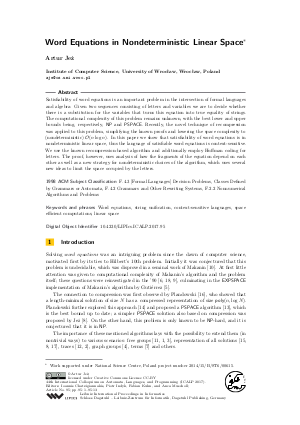Word Equations in Nondeterministic Linear Space
Author Artur Jez
-
Part of:
Volume:
44th International Colloquium on Automata, Languages, and Programming (ICALP 2017)
Part of: Series: Leibniz International Proceedings in Informatics (LIPIcs)
Part of: Conference: International Colloquium on Automata, Languages, and Programming (ICALP) - License:
 Creative Commons Attribution 3.0 Unported license
Creative Commons Attribution 3.0 Unported license
- Publication Date: 2017-07-07
File

PDF
LIPIcs.ICALP.2017.95.pdf
- Filesize: 431 kB
- 13 pages
Document Identifiers
Subject Classification
Keywords
- Word equations
- string unification
- context-sensitive languages
- space efficient computations
- linear space
Metrics
- Access Statistics
-
Total Accesses (updated on a weekly basis)
0Document
0Metadata
Abstract
Satisfiability of word equations is an important problem in the intersection of formal languages and algebra: Given two sequences consisting of letters and variables we are to decide whether there is a substitution for the variables that turns this equation into true equality of strings. The computational complexity of this problem remains unknown, with the best lower and upper bounds being, respectively, NP and PSPACE. Recently, the novel technique of recompression was applied to this problem, simplifying the known proofs and lowering the space complexity to (nondeterministic) O(n log n). In this paper we show that satisfiability of word equations is in nondeterministic linear space, thus the language of satisfiable word equations is context-sensitive. We use the known recompression-based algorithm and additionally employ Huffman coding for letters. The proof, however, uses analysis of how the fragments of the equation depend on each other as well as a new strategy for nondeterministic choices of the algorithm, which uses several new ideas to limit the space occupied by the letters.
Cite As Get BibTex
Artur Jez. Word Equations in Nondeterministic Linear Space. In 44th International Colloquium on Automata, Languages, and Programming (ICALP 2017). Leibniz International Proceedings in Informatics (LIPIcs), Volume 80, pp. 95:1-95:13, Schloss Dagstuhl – Leibniz-Zentrum für Informatik (2017)
https://doi.org/10.4230/LIPIcs.ICALP.2017.95
BibTex
@InProceedings{jez:LIPIcs.ICALP.2017.95,
author = {Jez, Artur},
title = {{Word Equations in Nondeterministic Linear Space}},
booktitle = {44th International Colloquium on Automata, Languages, and Programming (ICALP 2017)},
pages = {95:1--95:13},
series = {Leibniz International Proceedings in Informatics (LIPIcs)},
ISBN = {978-3-95977-041-5},
ISSN = {1868-8969},
year = {2017},
volume = {80},
editor = {Chatzigiannakis, Ioannis and Indyk, Piotr and Kuhn, Fabian and Muscholl, Anca},
publisher = {Schloss Dagstuhl -- Leibniz-Zentrum f{\"u}r Informatik},
address = {Dagstuhl, Germany},
URL = {https://drops.dagstuhl.de/entities/document/10.4230/LIPIcs.ICALP.2017.95},
URN = {urn:nbn:de:0030-drops-74089},
doi = {10.4230/LIPIcs.ICALP.2017.95},
annote = {Keywords: Word equations, string unification, context-sensitive languages, space efficient computations, linear space}
}
Author Details
References
-
Volker Diekert, Claudio Gutiérrez, and Christian Hagenah. The existential theory of equations with rational constraints in free groups is PSPACE-complete. Inf. Comput., 202(2):105-140, 2005.

- Volker Diekert, Artur Jeż, and Manfred Kufleitner. Solutions of word equations over partially commutative structures. In Ioannis Chatzigiannakis, Michael Mitzenmacher, Yuval Rabani, and Davide Sangiorgi, editors, ICALP, volume 55 of LIPIcs, pages 127:1-127:14. Schloss Dagstuhl - Leibniz-Zentrum fuer Informatik, 2016. URL: http://dx.doi.org/10.4230/LIPIcs.ICALP.2016.127.
- Volker Diekert, Artur Jeż, and Wojciech Plandowski. Finding all solutions of equations in free groups and monoids with involution. Inf. Comput., 251:263-286, 2016. URL: http://dx.doi.org/10.1016/j.ic.2016.09.009.
-
Volker Diekert and Markus Lohrey. Word equations over graph products. International Journal of Algebra and Computation, 18(3):493-533, 2008.

- Claudio Gutiérrez. Satisfiability of word equations with constants is in exponential space. In FOCS, pages 112-119. IEEE Computer Society, 1998. URL: http://dx.doi.org/10.1109/SFCS.1998.743434.
-
Joxan Jaffar. Minimal and complete word unification. J. ACM, 37(1):47-85, 1990.

- Artur Jeż. Context unification is in PSPACE. In Elias Koutsoupias, Javier Esparza, and Pierre Fraigniaud, editors, ICALP, volume 8573 of LNCS, pages 244-255. Springer, 2014. URL: http://dx.doi.org/10.1007/978-3-662-43951-7_21.
- Artur Jeż. Recompression: a simple and powerful technique for word equations. J. ACM, 63(1):4:1-4:51, Mar 2016. URL: http://dx.doi.org/10.1145/2743014.
-
Antoni Kościelski and Leszek Pacholski. Complexity of Makanin’s algorithm. J. ACM, 43(4):670-684, 1996.

-
Gennadií Makanin. The problem of solvability of equations in a free semigroup. Matematicheskii Sbornik, 2(103):147-236, 1977. (in Russian).

-
Gennadií Makanin. Equations in a free group. Izv. Akad. Nauk SSR, Ser. Math. 46:1199-1273, 1983. English transl. in Math. USSR Izv. 21 (1983).

-
Yuri Matiyasevich. Some decision problems for traces. In Sergej Adian and Anil Nerode, editors, LFCS, volume 1234 of LNCS, pages 248-257. Springer, 1997. Invited lecture.

- Wojciech Plandowski. Satisfiability of word equations with constants is in NEXPTIME. In STOC, pages 721-725. ACM, 1999. URL: http://dx.doi.org/10.1145/301250.301443.
- Wojciech Plandowski. Satisfiability of word equations with constants is in PSPACE. J. ACM, 51(3):483-496, 2004. URL: http://dx.doi.org/10.1145/990308.990312.
- Wojciech Plandowski. An efficient algorithm for solving word equations. In Jon M. Kleinberg, editor, STOC, pages 467-476. ACM, 2006. URL: http://dx.doi.org/10.1145/1132516.1132584.
- Wojciech Plandowski and Wojciech Rytter. Application of Lempel-Ziv encodings to the solution of word equations. In Kim Guldstrand Larsen, Sven Skyum, and Glynn Winskel, editors, ICALP, volume 1443 of LNCS, pages 731-742. Springer, 1998. URL: http://dx.doi.org/10.1007/BFb0055097.
-
Alexander A. Razborov. On Systems of Equations in Free Groups. PhD thesis, Steklov Institute of Mathematics, 1987. In Russian.

- Klaus U. Schulz. Makanin’s algorithm for word equations - two improvements and a generalization. In Klaus U. Schulz, editor, IWWERT, volume 572 of LNCS, pages 85-150. Springer, 1990. URL: http://dx.doi.org/10.1007/3-540-55124-7_4.
